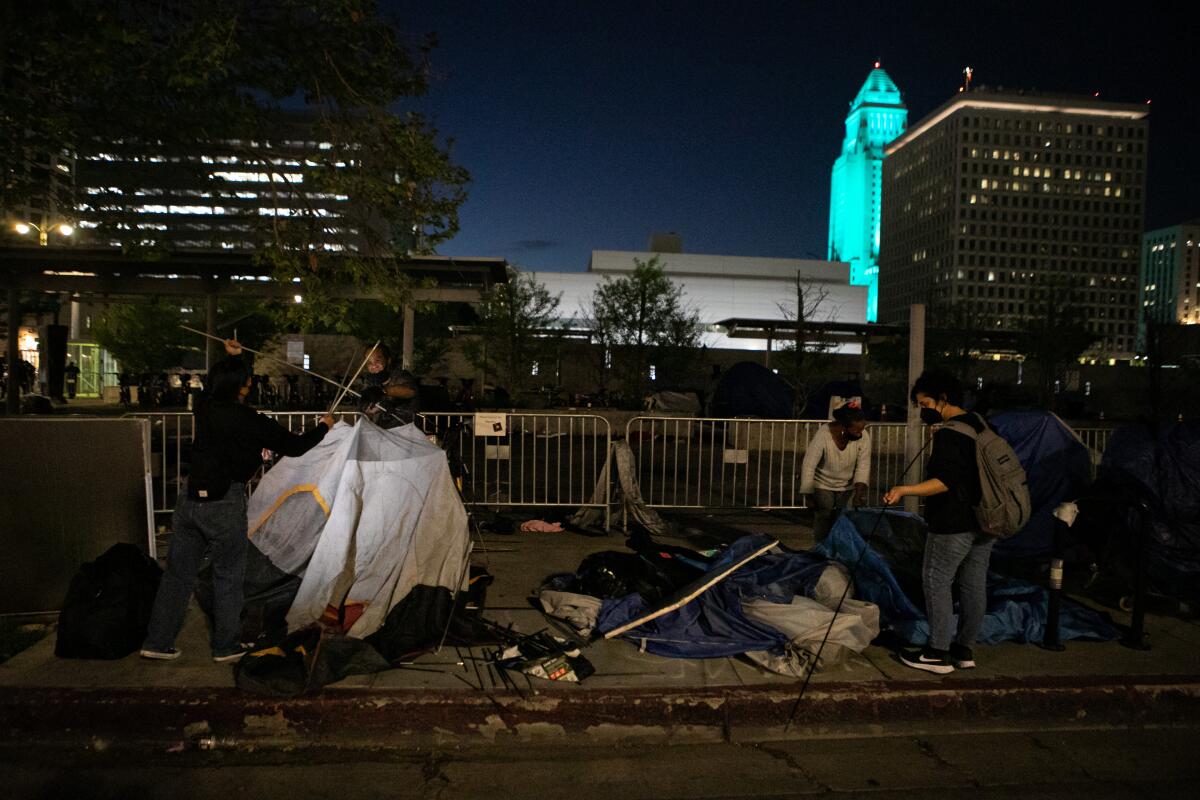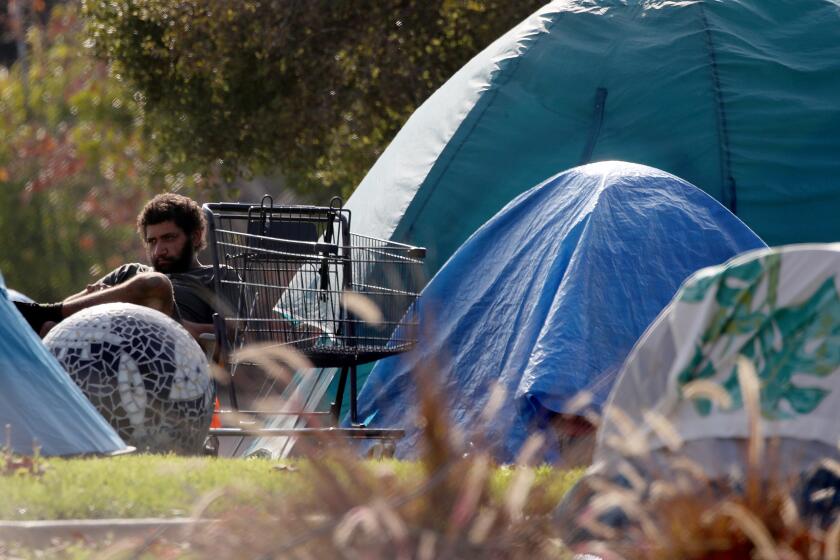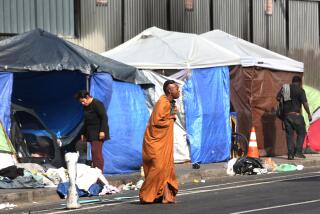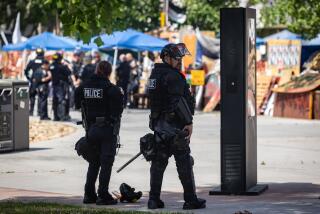L.A. homeless encampment is cleared amid taunts and shoves

- Share via
Night was falling Thursday when sanitation crews had to pause work on clearing a homeless encampment at a Little Tokyo plaza.
A protester had jumped into a sanitation truck and refused to get out. She cursed and yelled at sanitation workers for tearing down the encampment. By then, most of the homeless people had been given temporary housing or moved to the sidewalk.
The 10-minute standoff was one of several clashes that continued past midnight as sanitation crews tried to clear and fence off Toriumi Plaza, reflecting the knot of tensions in a city with little agreement on how to deal with the homeless crisis.
Protesters targeted city and county employees, even getting into a shoving altercation with a staff member of City Councilman Kevin de León, who had led the effort to clear the encampment in his district and place people in some form of housing.
Pete Brown, the communications director for De León, said outreach workers with the Los Angeles Homeless Services Authority had placed 45 people into temporary housing that includes hotel rooms through Project RoomKey, part of the state response to the COVID-19 pandemic to get homeless people in temporary accommodations.
That number was in addition to the 61 people that workers had already helped move into short-term housing since Feb. 16, bringing the total number of people to 106, according to Brown.
“It was a very successful night,” Brown said Thursday evening.
“I think today was very successful because the overall goal was to secure housing for our unhoused neighbors,” De León said in phone interview Thursday evening. “And overwhelmingly, our unhoused neighbors at the plaza have accepted housing, and that’s a good thing for our community.”

Homeless people began to camp out at the plaza two years ago at the start of the pandemic. The city allowed the encampment to stay because it was following U.S. Centers for Disease Control and Prevention guidelines.
Residents and business owners said at first there were no problems, but over time the encampment started to grow in size and get more unruly.
For the tourists, it may be the Ocean Front Walk of old: quirky shops, beachfront restaurants, sculpted bodies and assorted sketchy characters. But for residents, last summer’s effort to clear nearly 200 tents from the promenade didn’t do the job.
Brian Kito, a business owner and president of the Little Tokyo Public Safety Assn., said he saw drug use, fires and fights break out at the encampment. He recorded a few on his cellphone.
“There were a number of overdoses at the plaza,” he said. “The Fire Department was responding pretty regularly.”
The complaints caught the attention of De León, who moved to place people in housing so that repairs could be made at the plaza, which sits atop an underground parking garage at the corner of 1st Street and Judge John Aiso Street.
Brown said outreach workers began visiting on Feb. 16. Their plans to clear the encampment angered activists with J-Town Action and Solidarity. The grass-roots community group said it had spent more than a year providing hot meals, personal protective equipment and clothes to residents in the plaza.
Steven Chun, an organizer with the group, said its protest was in part to protect the rights of the residents at the encampment who don’t necessarily want hotel rooms, shelters or tiny homes because of how rigidly controlled they are.
“They feel like prisoners and caged animals,” Chun said.
J-Town Action and Solidarity wanted the closure of the encampment to be canceled and for the city to increase more services for homeless people who are living in tents until permanent housing is available.
When the group learned that the plaza was scheduled to be cleared and fenced off, it began mobilizing on social media. Members held a rally on March 13 to spread awareness and recruit more support.
The group, with other homeless advocacy groups such as We the Unhoused and Street Watch, descended on the plaza Thursday morning, taping signs to a metal barrier that the city had placed around the encampment.
Throughout most of the day, the activists teetered between helping homeless people and shaming outreach workers, sanitation crews and city staff who were there to assist with the cleanup.
About 8 p.m., there were only five homeless people left in the plaza, two hours before the deadline to clear it. But disruptions from earlier in the day by activists had delayed the cleanup effort.
Throughout the night, activists would help any of the remaining residents of the encampment move their items onto the sidewalk. Things were mostly peaceful until 11 p.m., when activists and Brown got into a shoving match. There were no arrests.
Shortly after midnight, Los Angeles Police Department officers walked into the plaza and told activists they needed to stand outside of the barrier. They began escorting at least three of them while others used their phones to record the interaction with police, shouting epithets at the officers.
Two homeless people began to pack items into plastic bags and moved their tents to the sidewalk with others who had declined short-term housing. All were in their tents, sleeping amid the early morning shouts.
More to Read
Sign up for Essential California
The most important California stories and recommendations in your inbox every morning.
You may occasionally receive promotional content from the Los Angeles Times.












